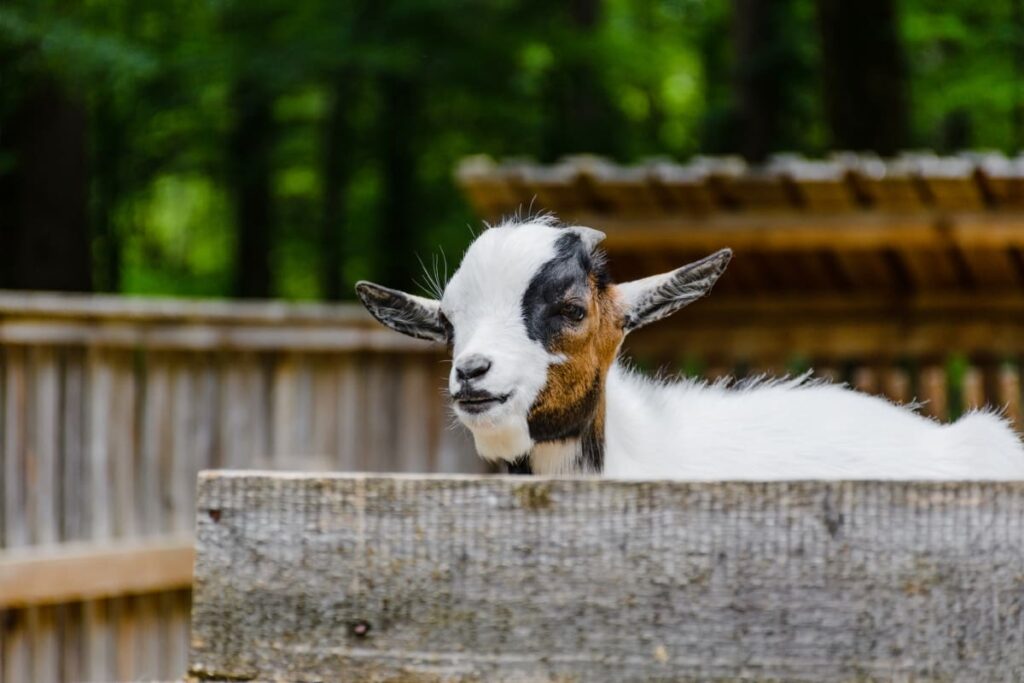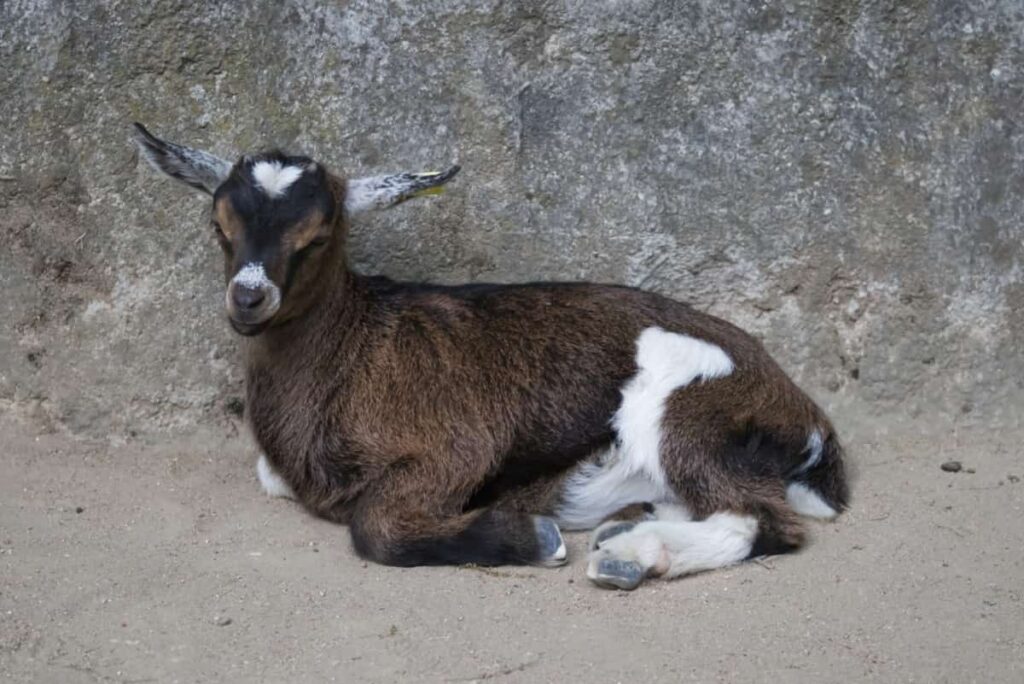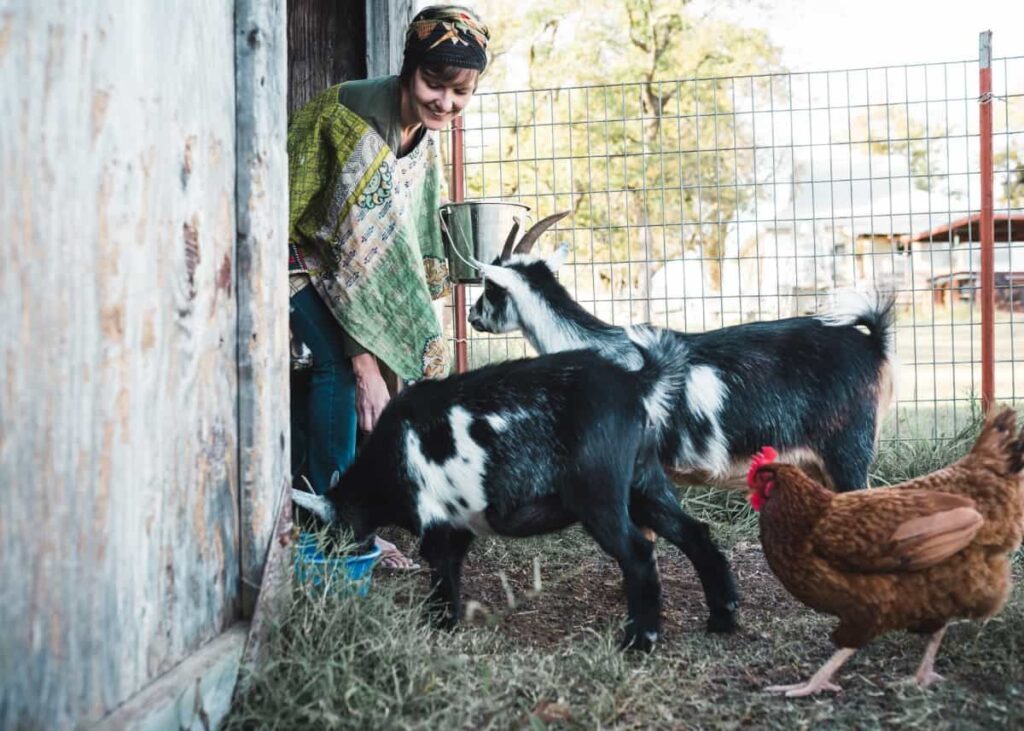Understanding the nutritional requirements of pygmy goats is crucial for their overall health and well-being. These adorable creatures rely on a balanced diet to thrive. Pygmy goats require a well-balanced diet for optimal health and growth.

Pygmy Goat Feed Management
The Importance of a Balanced Diet
Proper feed management is important for the pygmy goat’s health. These adorable creatures have specific dietary needs that must be met to thrive. Properly managing their feed is crucial for their overall health and well-being. A balanced diet for pygmy goats consists of various nutrients, including proteins, fats, carbohydrates, vitamins, minerals, and water.
Basic Feed Types for Pygmy Goats
Hay: Types and Quality
Hay is an essential part of a pygmy goat’s diet. It provides roughage, aids in digestion, and helps maintain dental health. There are different types of hay available, including grass hay like timothy or orchard grass, as well as legume hay such as alfalfa or clover.
Concentrates: Grains and Commercial Feeds
Concentrates refer to grains and commercial feeds that provide additional nutrients beyond what can be obtained from forage alone. Grains commonly fed to pygmy goats include corn, oats, barley, or wheat. Commercial feeds specifically formulated for goats often contain a mix of grains along with added vitamins and minerals.
Pasture and Forage: Benefits and Management
Pasture and forage are excellent sources of nutrition for your pygmy goats. They allow them to graze freely on grasses, weeds, shrubs, leaves, and other vegetation found in their environment. Managing pasture and forage involves rotating grazing areas regularly to prevent over-grazing while allowing time for regrowth.
Nutritional Requirements
Macronutrients: Proteins, Fats, and Carbohydrates
Proteins are necessary for the growth and repair of body tissues, while fats provide energy and help regulate body temperature. Carbohydrates serve as an immediate energy source for these active little creatures.
Micronutrients: Vitamins and Minerals
Pygmy goats also require an adequate intake of micronutrients such as vitamins and minerals. These micronutrients support various bodily functions like metabolism, immune system function, bone development, and reproduction.
Water: The Essential Nutrient
Water is often overlooked but is the most essential nutrient for pygmy goats. It helps maintain proper hydration levels and aids in digestion, nutrient absorption, temperature regulation, waste elimination, and overall bodily functions.
Feeding Guidelines by Life Stage
Kids: Birth to Weaning
During this period, it is crucial to provide them with colostrum from their mother within the first few hours after birth. As they grow older, gradually introduce hay and high-quality milk replacer until they are ready for solid food. Slowly transition them onto a balanced diet that includes hay, concentrates, and access to fresh water.
Growing Goats: Weaning to Maturity
In this stage, you can start incorporating more concentrates into your diet while still providing ample amounts of roughage like hay or pasture grass. It’s important not to overfeed during this stage as it can lead to health issues.
Adult Maintenance
Once your goats reach adulthood, focus on Adult Maintenance feeding guidelines, which consist mainly of good quality hay or pasture grass along with limited amounts of concentrate feeds based on their activity level and overall body condition.
Pregnancy and Lactation
During Pregnancy and Lactation periods, pregnant does require extra nutrients for fetal development while lactating does need increased energy levels for milk production. Adjust their diet accordingly by offering higher protein content feed or supplements formulated specifically for these stages.
In case you missed it: Boer Goat Feed Management: Understanding Feeding Requirements, Program, Schedule, and Rations

Supplemental Feeding
When to Supplement
Supplemental feeding plays a crucial role in ensuring the optimal health and well-being of your pygmy goats. When it comes to determining when to supplement your pygmy goats’ diet, there are a few key factors to keep in mind. Firstly, pay attention to your goats’ body condition. If you notice that they are losing weight or not maintaining proper body condition despite being on a balanced diet, supplementation may be necessary.
Types of Supplements
Types of supplements for pygmy goats can vary depending on specific needs. Some common options include mineral blocks or loose minerals, which provide essential vitamins and minerals that may be lacking in their regular feed. Protein supplements like alfalfa pellets or soybean meal can help meet increased protein requirements during periods of growth or reproduction.
Forage and Grazing Management
Rotational Grazing Techniques
Rotational grazing techniques can greatly benefit your goats and the pasture they graze on. By dividing the pasture into smaller sections and rotating the goats between them, you allow for better utilization of available forage while also giving the pastures time to recover.
Selecting Quality Forage
When selecting quality forage for your pygmy goats, keep in mind their dietary needs. Choose for grasses that are high in nutritional value such as Bermuda grass or Timothy grass. Avoid toxic plants like ragwort or hemlock, as they can be harmful to your goats.
Pasture Improvement and Maintenance
Pasture improvement and maintenance should also be a priority. Regularly mow the pasture to prevent it from becoming overgrown and unpalatable. Fertilize it with appropriate nutrients to ensure optimal growth of nutritious vegetation.
Feed Storage and Management
Storing Hay and Grains
When storing hay, it’s important to keep it off the ground to avoid moisture absorption. Using pallets or racks allows for better air circulation and helps prevent decay. Additionally, inspecting the hay for signs of mold or dust before feeding can help ensure its quality. Grains should be stored in containers with tight-fitting lids to protect them from pests such as rodents or insects. Keeping grains in cool areas prevents spoilage due to heat exposure.
Preventing Mold and Contamination
Preventing mold and contamination involves regular cleaning of storage areas and equipment used for feed handling. It’s also advisable to use separate containers for different types of feed to avoid cross-contamination.
In case you missed it: Australian Melaan Goat: Characteristics, Price, Disadvantages, and Raising

Health Considerations in Feeding
Identifying Nutritional Deficiencies
Understanding the health considerations in feeding is crucial to avoid any potential problems that may arise. Nutritional deficiencies can have an impact on the overall well-being of your pygmy goats. If you suspect a deficiency, consult with a veterinarian who can recommend appropriate supplements or adjustments to the goat’s diet.
Overfeeding and Obesity
Overfeeding can lead to obesity in pygmy goats, which can have implications for their health. Obesity increases the risk of joint issues, heart problems, and other related conditions. Be careful of portion sizes and ensure they are receiving an appropriate amount of food based on their age, size, and activity level.
Toxic Plants and Foods to Avoid
The main consideration is knowing which plants and foods are toxic to pygmy goats. Some common examples include rhododendron bushes, azaleas, chocolate products containing theobromine (such as cocoa), onions/garlic family plants (including chives), and wilted cherry leaves/stems/pits. Familiarize yourself with these potential dangers so you can keep your pygmies safe from harm.
Feed Cost Management
Budgeting for Feed Costs
Budgeting for feed costs helps ensure that you can provide the necessary nutrition for your goats without breaking the bank. It allows you to plan and allocate funds specifically for their dietary needs.
Cost-Effective Feeding Strategies
To effectively manage feed costs, it’s crucial to implement cost-effective feeding strategies. One strategy is to purchase in bulk or directly from local farmers, which can often result in lower prices compared to buying small quantities from retail stores. Another cost-effective approach is evaluating feed quality versus price. While it may be tempting to opt for cheaper feeds, it’s important not to compromise on quality.
Monitoring and Adjusting the Diet
Regular Health Check-Ups
Monitoring and adjusting the diet of your pygmy goats is an important aspect of their overall health and well-being. Regular health check-ups play a main role in ensuring that your goats are receiving the right nutrients and maintaining a balanced diet. During these check-ups, it’s important to work closely with a veterinarian who specializes in small ruminants.
Adjusting Diet Based on Health and Activity
The key aspect of adjusting the diet is monitoring the overall health of your goats. Regular check-ups with a veterinarian can provide valuable insights into any potential deficiencies or health issues that may require adjustments in their diet. Another factor to consider is the activity level of your pygmy goats. It’s also essential to evaluate if there are any changes in weight or body condition.
Keeping Feeding Records
Keeping detailed feeding records of Pygmy goats can also be incredibly helpful when monitoring and adjusting the diet of your pygmy goats. By recording what you feed them each day, along with any modifications made based on veterinary recommendations or observed changes in behavior, you can track patterns over time.
In case you missed it: Managing Parasites in Goats: Prevention, Diagnosis, and Treatment

Conclusion
Feed management refers to the careful planning and implementation of a balanced diet for pygmy goats. This includes understanding Pygmy goat’s nutritional needs at different life stages, selecting appropriate feed types, and ensuring proper storage and management of their food. Proper feed management ensures that they receive all the essential nutrients they need for growth and development.
- Types of Grass Growing for Goat Farm
- How to Train Goats for Milking: A Beginners Guide
- Goat Milking Practices and Equipment: A Beginner’s Guide
- Goat Farming for Fiber: Producing Mohair and Cashmere
- Maximizing Goat Milk Production: Tips for Dairy Goat Farmers
- Goat Farming as a Family Business: Strategies for Success
- Profitable Kenya Goat Breeds for Commercial Dairy and Meat Business
- Unlock the Secrets of Oberhasli Goat: Discover Raising and Management Practices
- Ultimate Guide to Myotonic Goats: Explore Profile to Raising